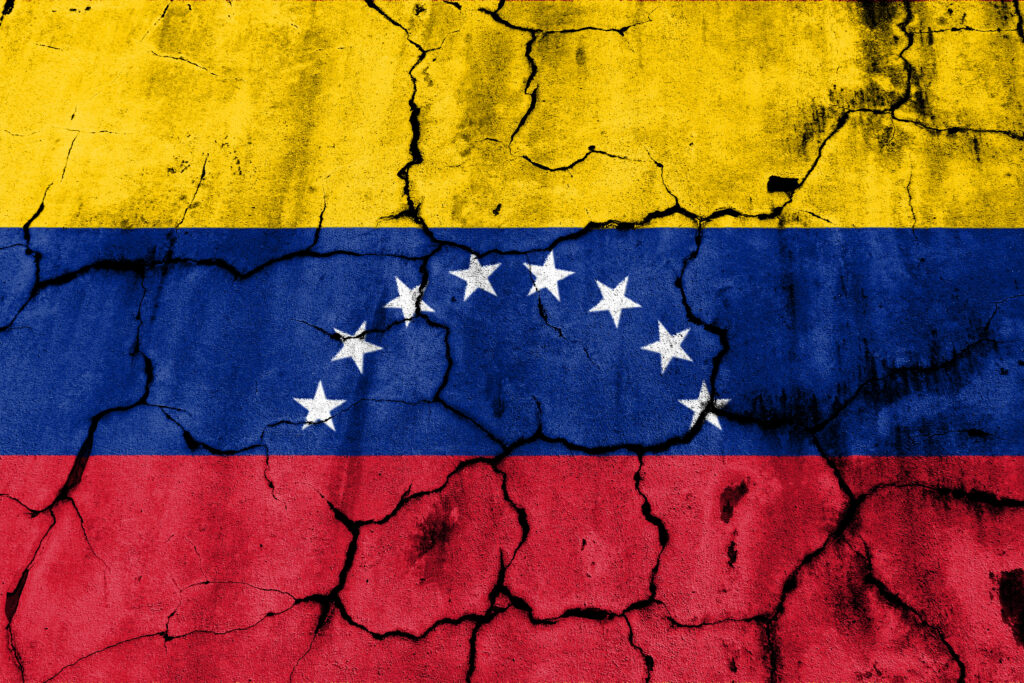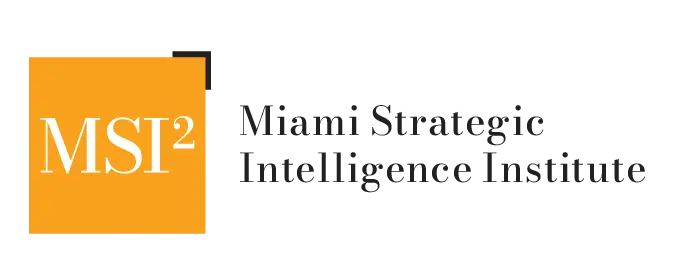05 May Fracture at the Summit: The Internal War Between Diosdado Cabello and Delcy Rodríguez and the Role of U.S. Sanctions
By,
Jesús Daniel Romero, Co-Founder and Senior Fellow, MSI² & William Acosta, SME
Executive Summary
The Chavista regime is facing its deepest internal fracture in years. The escalating power struggle between Diosdado Cabello and the Rodríguez siblings has triggered political purges, selective detentions, and surveillance maneuvers that reveal the decomposition of the Bolivarian power structure.
This conflict stems directly from the sustained pressure of U.S. sanctions, which have reshaped the Chavista power map and forced its leaders to seek new international allies under a climate of deep mistrust.
1. Power Reconfiguration: Diosdado Cabello Regains Control Over Security Forces
On August 27, 2024, Nicolás Maduro appointed Diosdado Cabello Minister of the Interior and Vice President for Citizen Security, granting him direct control over the regime’s repressive apparatus (Diario de Cuba, 2024). This move came after Maduro’s electoral defeat in July —led by Jorge Rodríguez’s campaign— which weakened the influence of the Rodríguez faction (Wikipedia, 2025). Cabello took advantage of the moment by placing loyalists, such as his cousin Alexis Rodríguez Cabello, at the head of SEBIN.
2. The Oil Purge: Pedro Tellechea Falls
The arrest of Pedro Tellechea, then-president of PDVSA and close ally of Delcy Rodríguez, marked the first major blow by the Cabello faction against the Rodríguez economic apparatus (Diario de Cuba, 2024). His detention on treason charges significantly weakened Delcy’s financial network and solidified Cabello’s dominance over state resources.
3. Surveillance and Control: Daniela Cabello as Political Watchdog
Daniela Cabello, daughter of Diosdado and president of the Venezuelan Export and Nation Brand Agency, was assigned to accompany Delcy Rodríguez on official missions to China, India, Turkey, and Qatar. According to journalistic and video reports, Daniela acts as a political monitor, tracking Delcy’s every move, limiting her autonomy, and reporting back to her father (Infobae, 2025; YouTube, 2025; EVTV Miami, 2025). This surveillance dynamic highlights the deep paranoia within the Chavista elite.
Given the threat of international sanctions —such as those imposed on Daniela by the United States— emergency extraction operations have been activated to prevent her detention abroad (Fogade, 2025; Elflacowill, 2025).

4. Diplomacy Under Surveillance: Delcy Rodríguez’s April 2025 Trips
During her official visit to China (April 23–29), Delcy Rodríguez held 17 official meetings, including one with Vice Premier Han Zheng. Over 600 bilateral agreements were updated in sectors like energy, technology, infrastructure, and health, and new negotiations were sealed with CNPC to secure investments in Venezuelan crude (Venezuelanalysis, 2025). She also visited firms such as Lenovo and Westwell to explore artificial intelligence applications in social programs and the oil sector.
Subsequently, in Doha, Qatar, Rodríguez met with Prime Minister Mohammed bin Abdulrahman Al Thani and Energy Minister Saad bin Sherida Al Kaabi to discuss enhanced cooperation in energy, health, finance, and AI (Venezuelanalysis, 2025). Daniela Cabello’s active presence during both trips (Infobae, 2025) reaffirmed her role as the Cabello faction’s political enforcer.
5. U.S. Sanctions as a Catalyst for Internal Conflict
Since 2017, U.S. sanctions have targeted over 150 individuals and 100 entities linked to the Venezuelan regime, including Nicolás Maduro, Delcy Rodríguez, Jorge Rodríguez, and Diosdado Cabello himself (El País, 2024). These measures have restricted the government’s access to international markets, triggering a 71% drop in per capita GDP (Cepr.net, 2025; Telesur, 2024).
The reactivation of sanctions in April 2024—after opposition leaders were barred from elections—further intensified pressure on the regime (El País, 2024). In response, the government doubled down: strengthening internal repression through targeted purges and seeking new international partners—China, India, and Qatar—to bypass Washington’s restrictions (Lisa News, 2025; Fogade, 2025).
6. Parallel Operators and Sanctions Evasion Networks: The Alex Saab Case
Amid mounting external pressure and internal instability, the Maduro regime has activated parallel financial channels to preserve capital flows and strike strategic deals. In this scheme, Alex Saab emerges once again as a key figure.
Saab—currently facing prosecution in the U.S. following his extradition from Cape Verde—was the regime’s chief financial operator for over a decade. He engineered complex sanctions-evasion networks involving gold, food, oil, and crypto, using intermediaries in Turkey, the UAE, Iran, and Russia.
According to investigative journalism and intelligence sources, Saab continues to operate covertly through proxies and shell companies, many still active in Dubai, Hong Kong, and Istanbul. These networks may be facilitating recent oil and technology deals with China, India, and Qatar (Venezuelanalysis, 2025; Infobae, 2025).
Delcy’s April trips—closely shadowed by Daniela—included cities where Saab’s financial routes are known to exist. His historical ties to Delcy and expertise in opaque transactions make it highly likely that Saab is now coordinating alternative payment schemes (gold, crypto, bartering) to shield Venezuela’s new deals from U.S. sanctions.
Strategic Conclusion
The confrontation between Diosdado Cabello and the Rodríguez siblings reflects the Chavista regime’s internal decay. Power is no longer exercised through ideology or charisma, but through mutual surveillance, repressive control, and urgent financial survival.
This fracture represents a strategic window of opportunity for the United States and its hemispheric allies. Escalating multilateral pressure, enhancing regional intelligence cooperation, and supporting democratic actors could accelerate the regime’s disintegration from within.
References
YouTube. (2025, April 26). Breaking News: Terror Within the Regime. Diosdado Takes Revenge [Video]. https://www.youtube.com/watch?v=fmOOZsjqVMk
Cepr.net. (2025, March 12). Economic sanctions: A root cause of migration. https://cepr.net/es/publications/sanciones-economicas-una-causa-raiz-de-la-migracion/
Diario de Cuba. (2024, October 22). With the security organs under Diosdado Cabello’s wing, a new purge hits the oil sector. https://diariodecuba.com/internacional/1729595077_57910.html
El País. (2024, April 19). The effect of U.S. sanctions on Venezuela. https://elpais.com/america/2024-04-19/tres-administraciones-y-presion-politica-intermitente-el-efecto-de-las-sanciones-de-estados-unidos-en-venezuela.html
El País. (2025, March 28). The threat of new sanctions and Trump’s trade war hit Venezuela’s economy hard. https://elpais.com/america/2025-03-28/la-amenaza-de-nuevas-sanciones-y-la-guerra-comercial-de-trump-golpean-de-lleno-la-economia-venezolana.html
Elflacowill. (2025, April 29). While Venezuelans struggle, Daniela Cabello travels the world with Delcy Rodríguez [Video]. https://www.youtube.com/watch?v=AjZEq1ZnO0E
EVTV Miami. (2025, April 25). Delcy and Daniela Cabello did it [Video]. https://www.youtube.com/watch?v=7B9n7a-78Dg
Fogade. (2025, February 11). Venezuela signs energy agreements with India and incorporates the 7Ts with China. https://www.fogade.gob.ve/2025/02/11/venezuela-firma-convenios-de-energia-con-india-e-incorpora-las-7t-con-china/
Infobae. (2025, March 11). The five power groups in Venezuela that traveled in the luxurious jet seized by the U.S. https://www.infobae.com/venezuela/2025/03/11/los-cinco-grupos-de-poder-en-venezuela-que-viajaron-en-el-lujoso-avion-incautado-por-eeuu-a-la-dictadura-de-maduro/
Lisa News. (2025, March 6). Maduro’s response to new international pressure. https://www.lisanews.org/internacional/cual-ha-sido-la-respuesta-de-maduro-ante-las-nuevas-presiones-internacionales/
Telesur. (2024, July 27). Sanctions caused a crisis three times worse than the Great Depression in the U.S., says The Washington Post. https://www.telesurtv.net/la-guerra-economica-y-las-consecuencias-de-la-politica-de-sanciones-estadounidenses/
Venezuelanalysis. (2025, May 1). Venezuela’s Vice President Touts New Energy Investment Following Trip to China. https://venezuelanalysis.com/news/venezuelas-vice-president-touts-new-energy-investment-following-trip-to-china/
Wikipedia. (2025, March 20). 2024 Venezuelan political crisis. https://en.wikipedia.org/wiki/2024_Venezuelan_political_crisis
